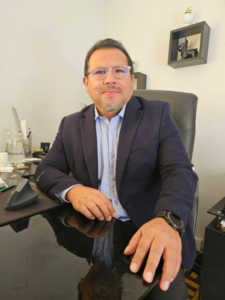Meet AIM Grant Recipient: AIS Peru

Earlier this year, Global Health Council awarded its second round of Advocacy in Motion (AIM) Grants to five civil society organizations. These grants are intended to support advocacy, health equity, and amplify the voices of local and regional organizations. This month we are featuring one of our winners, Acción International para la Salud (AIS Peru).
Based in Lima, Acción International para la Salud (International Action for Health) advocates for universal access to health services, including medicines and other essential health technologies. We recently spoke with AIS Project Coordinator Javier Llamoza Jacinto to learn more about the organization and its work.
Q: Can you tell us about your organization?
International Action for Health (AIS Peru) is a nonprofit organization that was founded in 1996 with the goal of promoting access to medications and other essential health technologies as a vital part of the full exercise of the right to health. Since its creation, the organization has conducted numerous health studies and interventions with the aim of promoting a healthy society with a universal and high-quality health care system.
Q: This year’s grant is focused on pandemic preparedness. What were some of the challenges your organization, and your community, encountered in facing past pandemics like COVID-19?
The COVID-19 pandemic exposed the shortcomings and gaps in Peru’s health system, as well as the inadequacies of regional and global governance in reducing inequality. In addition to this, organized groups have disseminated disinformation that discourages the use of vaccines and other technologies. This has encouraged people to use products without scientific backing, creating a false sense of protection and placing the most vulnerable people at high risk.
Q: What do you think is missing from global pandemic preparedness planning efforts? What would you like to see changed at the global, national, and local level?
While countries have been making efforts to negotiate an agreement, convention, or other document for pandemic prevention, preparedness, and response, tensions between rich and poor countries do not allow sufficient commitments to ensure results that reduce inequalities and strengthen the response from the regions.
At the global level, it is necessary to strengthen governance under an independent system free of conflicts of interest. At the regional level, it is necessary to promote the integration of countries, drawing on effective and sovereign response capabilities. At the local level, it is necessary to have transparent negotiations and spaces.
Q: What is the biggest challenge your organization is facing today?
AIS is working to educate Peru’s legislative and executive administration in order to promote transparency on the issues being negotiated in the pandemic treaty, as well as their implications on national, regional, and global health. Particularly, we are pushing the Peruvian government to open a clear debate that includes the voices of citizens, civil society organizations, academia, and others. We are also pushing for countries in the region to articulate their position on pandemic preparedness.
At the local level, AIS is working to promote transparency of Peru’s national position on the issues being negotiated in the pandemic treaty and engage civil society to create a precedent for future negotiations. At the regional level, we are engaging with Latin American civil society organizations to encourage the governments of our countries to articulate a regional pandemic response approach.
Q: What are you currently doing to overcome these challenges? What help do you need to overcome them?
At the local level, AIS has participated in three meetings with civil society and public institutions to report on the treaty, where we asked parliamentarians to demand that the executive be transparent about Peru’s position in the negotiations. In December 2023, a first meeting was held in the Congress of the Republic of Peru, where a representative of AIS Peru gave details of the process.
It is still necessary to strengthen the involvement of civil society by raising awareness through workshops, launching a communications campaign, and hosting meetings with academia to build proposals. In our regional work, we are conducting informational webinars and working to strengthen the participation of Latin American civil society.
Q: How are you hoping the AIM Grant will help your organization?
We plan to use the AIM grant to create an incidence response plan for the Peruvian government, develop information and awareness-raising documents and communication materials, and continue regional articulation activities for the incidence plan.
Q: What is the most important message you want to give to global health decision-makers about pandemic preparedness?
Adopt clear and effective mechanisms for equity and strengthen the capacity of middle- and low-income countries to implement timely responses to disease outbreaks.
Q: Is there anything else you’d like us to know?
Supporting civil society organizations is essential to strengthening regional incidence plans and building more robust and democratic governance that improves global health and accounts for the diversity and differences among regions and countries.